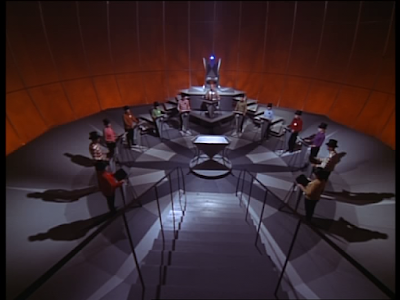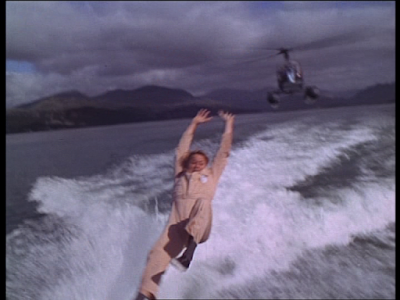The Delusion of Democracy
Written by Paddy Fitz (i.e Patrick McGoohan)
Directed by Patrick McGoohan
It's election day and No.6 is not surprised that No.2 is contesting unopposed. No.2 however asks him to run for his post. If he wins, No.1 will no longer be a mystery, and he will be in charge of The Village. Can No.6 win? If so, will he be able to plan a mass breakout? Will he learn who is No.1? Will he escape?
This episode was written and directed by Patrick McGoohan himself, and he clearly felt that this was an important theme. The script is very well written. It seems patently absurd that The Village would allow anyone to run for No.2's office. Yet it's a genius of the show, both in its concept, and how its written and directed, that what follows seems perfectly natural. However, as soon as he's been to the closing ceremony of the local council, we know he's being manipulated, a combination of drugs and sonic/light hypnosis.
As there's a carnival atmosphere to the election, clearly influenced more by the razzmatazz and showmanship of U.S. elections than the staid British ones of the 60s, we should pause to celebrate the art direction by Jack Shampan. The costuming (helped by Masada Wilmot) is excellent and distinctive. It's one of the factors in the show's success, and longevity. We have the piped black blazers for the men, pink blazers for The Press, striped sweaters, but there's also the multi-coloured capes and umbrellas, the white poker dealer caps or white leather caps for the ladies. The art direction, aided by Kenneth Bridgeman, adds to the show too, whether it's the council chamber with its descending steps, the pyramidal chair with single eye motif (very like The Masons don't you think?), then the Red Chamber into which No.6 descends. The contrast between the multi-coloured exterior and the single colour geodesic domes of the interior (with the purple light of the hypnosis treatment dominating) is delightful. In a show that has many delights, the production design overall is a major factor, nicely consistent but with enough variation to avoid monotony or blandness.
For a script that is by necessity very wordy (election proceedings being very verbal) McGoohan clearly recognises the need for action, and No.6's escape attempt by motorboat, whilst being chased by No.2 in a helicopter, is fantastic. It's so cinematic, even The Avengers never had such a dramatic action sequence, more like a Bond movie on British TV. The use of the helicopter, and the extensive location shooting (two months in Portmerion September & October 1966), was one of the reasons the show was so expensive, though helped by presale to CBS in America. How many shows could afford a helicopter on standby for several episodes? The accompanying incidental music, by Albert Elms, is also excellent, it does what a music score should do, increasing the tension and danger and pace of the sequence. Try watching it on mute and you'll see what I mean. I've included it along with some other incidental music below.
And speaking of that action sequence, let's also acknowledge how much better the show is with Albert Elms composing the music. And that sequence is excellent filmed by Brendan J Stafford BSC and camera operator Robert Monks who as part of the 2nd Unit worked on it. It's also excellently edited by Geoffrey Foot, as is the rest of the episode.
The acting, as it has been throughout the series so far, is superbly characterised and nuanced. Eric Portman, fresh from a superlative role in the film The Whisperers (1966) is excellent as No.2. He seems so amiable and reasonable, but notice the sequence in the cave, where he moves from drunk to sober, his malicious thumping of the mallet that causes No.6 to descend into a metaphorical pit of hell (notice the use of the colour red). And the way he delivers his line about not damaging the tissue is a chillingly accurate portrayal of the administrator as torturer. Rachel Herbert is delightful as Number 58, I don't know much about her except for her appearance in Danger Man, and it's a shame she never got larger roles.
Of course, there's one major theme this week, and that's the nature of democracy in a modern technocratic world. Though there's an ostensible election to decide who is to run The Village, when No.6 attempts to persuade the villagers to leave as he'll disable all the security devices and locks, it is met with indifference and inaction. They know he's not in charge. No.1 is, with the No.2 the representative of that power. This was a major concern of 60s thinking , indeed, has become more so this century, that democratic elections are a cosmetic front to hide the fact that the real power (No.1, Nuclear industry, the American military-industrial complex, or Global capitalism, take your pick) is never affected by the change of leadership, it remains constant. Certainly McGoohan in later interviews expressed his concern about the use of prisons in a so-called liberal society, and that we are our own prisoners.
What is lovely here is the way he's perfectly captured the razzmatazz of electioneering, where show and symbol has replaced substance. Notice the use of empty rhetoric and shallow phraseology used, and the use of buzz words. "More play and less work" sounds a great slogan, but it's pretty meaningless, it's something an adult would say to a child, which perfectly represents the treatment of the residents by The Village, authoritarianism disguised as paternalist concern. It's chilling though to hear No.6 engage in No.2 speak, talking about how his Village would be more kind and considerate in its enforced interrogation and imprisonment. At least No.2 hits the nail on the head with his comment about No.6 not having the experience that the "manipulation" of such a community entails, and he does use that word. In the end of course, the outcome of the election changes nothing, as it increasingly became apparent in the real world too. At least in the 60s, if you wanted to get rid of the real power structure of capitalism you could vote for the Communist party. Even that option is now gone as political parties increasingly fight over smaller and smaller slivers of the so-called 'middle ground', or narrow nationalist concerns.
Another interesting feature of the show, treated humorously here, is the nature of the Press in a democratic society. Nicely playing against the cerebral and serious main themes, and the action sequences, the show often uses humour and wit, which makes the show a delight to listen to as well as watch. The sequence where the reporter and photographer interview No.6 as candidate. as well as making a serious point, is also very funny. Asked a question, No.6 replies "no comment" at which point the reporter makes up a comment about Village security and other on-topic subjects, whilst the photographer just keeps saying "smile" while snapping away. When No.6 finally says something, "mind your own business", the reporter writes "no comment". Note how the press here sets the agenda of the election, with well worn phrases about tightening up security and increasing exports. Sounds familiar? And George Benson as the Labour Exchange Manager is a slyly humorous dig. "Very good technique. Where did you get him?", "The civil service. He adapted immediately".
Two final points before I sign off that have cropped up in earlier episodes. Firstly, there's No.6's surprise at seeing the identical person as photographer and newsvendor here, as he was with the Mechanic and Gardener in Arrival, helped by having the same actors play them. It's not mentioned why, and as far as I know only happens these two occasions. Apparently, one of the themes the show was to explore was human cloning, one of The Village experiments. It makes sense for a society concerned with conformity and the suppression of individuality to make its own inhabitants. But it wasn't followed up, and that theme was abandoned.
The other thing is the banning of alcohol, humorously pointed out in The Chimes of Big Ben, "genuine non-alcoholic whisky 24 work units, or genuine non-alcoholic vodka 16 work units. I hope there's nothing significant in that". Here in the night club he's offered non-alcoholic drinks and asks No.58 to get him real alcohol. And No.2 shows him the cave in the therapy zone which offers hooch, where he shows how clever The Village is by allowing one to be an alcoholic as long as one eventually complies and re-joins the fold . Obviously, alcohol, or any recreational drug use, would be forbidden, as it has a major effect on behaviour and mood, and would counteract any drug regimen The Village was prescribing. In The Village, all are hale and hearty and if not, are made so. Never has health sounded so repressive, so ... unhealthy!?
Incidental Music
VILLAGE rating (out of 6): No.6
Cast
The Prisoner .................................................................. PATRICK McGOOHAN
Number Two .................................................................. ERIC PORTMAN
Number Two .................................................................. ERIC PORTMAN
The Butler ..................................................................... ANGELO MUSCAT
Supervisor..................................................................... PETER SWANWICK
Number 58 .................................................................... RACHEL HERBERT
Labour Exchange Manager .................................. ....... GEORGE BENSON
Supervisor..................................................................... PETER SWANWICK
Number 58 .................................................................... RACHEL HERBERT
Labour Exchange Manager .................................. ....... GEORGE BENSON
Reporter ........................................................................ HAROLD BERENS
Photographer ................................................................ DENE COOPER
Waitress ........................................................................ HOLLY DOONE
2nd Supervisor .............................................................. KENNETH BENDA
First Mechanic................................................................ PETER BRACE
Second Mechanic .......................................................... ALF JOINT
2nd Supervisor .............................................................. KENNETH BENDA
First Mechanic................................................................ PETER BRACE
Second Mechanic .......................................................... ALF JOINT
Be Seeing You!




























































Comments
Post a Comment
All comments welcome, you don't need a Google account, but trolls beware, all comments are moderated.